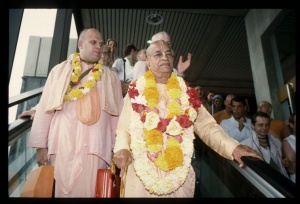SB 3.10.26: Difference between revisions
m (1 revision(s)) |
(Vanibot #0018 edit: make synonym terms in Sanskrit italic in SB - Vanisource) |
||
| Line 1: | Line 1: | ||
{{info | {{info | ||
|speaker=Maitreya | |speaker=Maitreya Ṛṣi | ||
|listener=Vidura | |listener=Vidura | ||
}} | }} | ||
[[Category:Srimad-Bhagavatam - Canto 03 Chapter 10]] | |||
[[Category:Bhagavatam Verses Spoken by Maitreya Rsi - Vanisource|031026]] | |||
<div style="float:left">'''[[Srimad-Bhagavatam]] - [[SB 3|Third Canto]] - [[SB 3.10: Divisions of the Creation|Chapter 10: Divisions of the Creation]]'''</div> | |||
<div style="float:right">[[File:Go-previous.png|link=SB 3.10.25]] '''[[SB 3.10.25]] - [[SB 3.10.27]]''' [[File:Go-next.png|link=SB 3.10.27]]</div> | |||
{{RandomImage}} | |||
==== TEXT 26 ==== | ==== TEXT 26 ==== | ||
<div | <div class="verse"> | ||
arvāk-srotas tu navamaḥ | :arvāk-srotas tu navamaḥ | ||
kṣattar eka-vidho nṛṇām | :kṣattar eka-vidho nṛṇām | ||
rajo 'dhikāḥ karma-parā | :rajo 'dhikāḥ karma-parā | ||
duḥkhe ca sukha-māninaḥ | :duḥkhe ca sukha-māninaḥ | ||
</div> | </div> | ||
| Line 16: | Line 22: | ||
==== SYNONYMS ==== | ==== SYNONYMS ==== | ||
<div | <div class="synonyms"> | ||
''arvāk''—downwards; ''srotaḥ''—passage of food; ''tu''—but; ''navamaḥ''—the ninth; ''kṣattaḥ''—O Vidura; ''eka-vidhaḥ''—one species; ''nṛṇām''—of human beings; ''rajaḥ''—the mode of passion; ''adhikāḥ''—very prominent; ''karma-parāḥ''—interested in working; ''duḥkhe''—in misery; ''ca''—but; ''sukha''—happiness; ''māninaḥ''—thinking. | |||
</div> | </div> | ||
| Line 23: | Line 29: | ||
==== TRANSLATION ==== | ==== TRANSLATION ==== | ||
<div | <div class="translation"> | ||
The creation of the human beings, who are of one species only and who stock their eatables in the belly, is the ninth in the rotation. In the human race, the mode of passion is very prominent. Humans are always busy in the midst of miserable life, but they think themselves happy in all respects. | The creation of the human beings, who are of one species only and who stock their eatables in the belly, is the ninth in the rotation. In the human race, the mode of passion is very prominent. Humans are always busy in the midst of miserable life, but they think themselves happy in all respects. | ||
</div> | </div> | ||
| Line 30: | Line 36: | ||
==== PURPORT ==== | ==== PURPORT ==== | ||
<div | <div class="purport"> | ||
The human being is more passionate than the animals, and thus the sex life of the human being is more irregular. The animals have their due time for sexual intercourse, but the human being has no regular time for such activities. The human being is endowed with a higher, advanced stage of consciousness for getting relief from the existence of material miseries, but due to his ignorance he thinks that his higher consciousness is meant for advancing in the material comforts of life. Thus his intelligence is misused in the animal propensities—eating, sleeping, defending and mating—instead of spiritual realization. By advancing in material comforts the human being puts himself into a more miserable condition, but, illusioned by the material energy, he always thinks himself happy, even while in the midst of misery. Such misery of human life is distinct from the natural comfortable life enjoyed even by the animals. | The human being is more passionate than the animals, and thus the sex life of the human being is more irregular. The animals have their due time for sexual intercourse, but the human being has no regular time for such activities. The human being is endowed with a higher, advanced stage of consciousness for getting relief from the existence of material miseries, but due to his ignorance he thinks that his higher consciousness is meant for advancing in the material comforts of life. Thus his intelligence is misused in the animal propensities—eating, sleeping, defending and mating—instead of spiritual realization. By advancing in material comforts the human being puts himself into a more miserable condition, but, illusioned by the material energy, he always thinks himself happy, even while in the midst of misery. Such misery of human life is distinct from the natural comfortable life enjoyed even by the animals. | ||
</div> | </div> | ||
__NOTOC__ | |||
<div style="float:right; clear:both;">[[File:Go-previous.png|link=SB 3.10.25]] '''[[SB 3.10.25]] - [[SB 3.10.27]]''' [[File:Go-next.png|link=SB 3.10.27]]</div> | |||
__NOTOC__ | |||
__NOEDITSECTION__ | |||
Revision as of 17:39, 30 November 2017

A.C. Bhaktivedanta Swami Prabhupada
TEXT 26
- arvāk-srotas tu navamaḥ
- kṣattar eka-vidho nṛṇām
- rajo 'dhikāḥ karma-parā
- duḥkhe ca sukha-māninaḥ
SYNONYMS
arvāk—downwards; srotaḥ—passage of food; tu—but; navamaḥ—the ninth; kṣattaḥ—O Vidura; eka-vidhaḥ—one species; nṛṇām—of human beings; rajaḥ—the mode of passion; adhikāḥ—very prominent; karma-parāḥ—interested in working; duḥkhe—in misery; ca—but; sukha—happiness; māninaḥ—thinking.
TRANSLATION
The creation of the human beings, who are of one species only and who stock their eatables in the belly, is the ninth in the rotation. In the human race, the mode of passion is very prominent. Humans are always busy in the midst of miserable life, but they think themselves happy in all respects.
PURPORT
The human being is more passionate than the animals, and thus the sex life of the human being is more irregular. The animals have their due time for sexual intercourse, but the human being has no regular time for such activities. The human being is endowed with a higher, advanced stage of consciousness for getting relief from the existence of material miseries, but due to his ignorance he thinks that his higher consciousness is meant for advancing in the material comforts of life. Thus his intelligence is misused in the animal propensities—eating, sleeping, defending and mating—instead of spiritual realization. By advancing in material comforts the human being puts himself into a more miserable condition, but, illusioned by the material energy, he always thinks himself happy, even while in the midst of misery. Such misery of human life is distinct from the natural comfortable life enjoyed even by the animals.